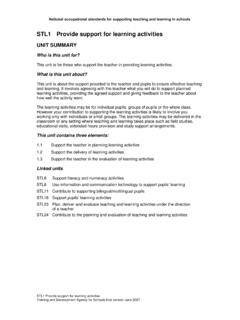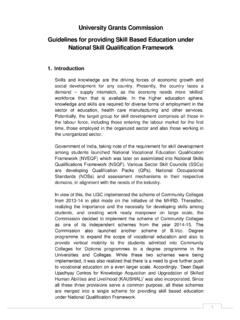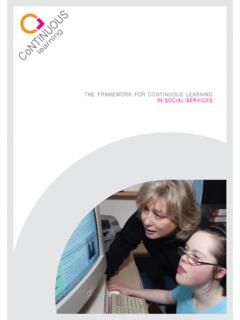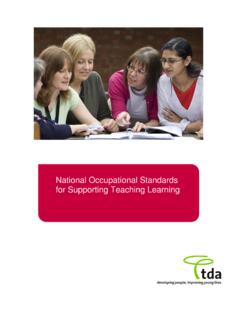Transcription of Youth Work National Occupational Standards 2019 …
1 1 2019 Youth Work National Occupational Standards Introduction (Please note Youth Work NOS were reviewed and published in 2019. No changes were made to the values, purpose and summary map through the consultation process. As a result no changes were made to this introduction document. It is effective from 2019 but may make reference to older reviews) Contents: Suite Functional Map 2019 and full details of Youth Work NOS database 2019 can be found in separate documents To find individual NOS on NOS Database: 2 2019 Suite Overview The Youth Work National Occupational Standards (NOS) aim to define the competencies required to carry out the functions carried out by the Youth work workforce. The NOS are intended to describe the competencies required to fulfil the tasks required in the Youth sector. The NOS are not designed to describe any specific Youth work role.
2 The NOS for Youth Work do not equate directly to qualifications, but are used to derive relevant competency-based qualifications for the Youth work sector. The NOS, as the agreed Standards of performance and knowledge required in Youth work practice across the UK, can be used by employers to inform job descriptions, consider skills needs and identify areas of improvement, and can also support an individual s professional and continuous development. The different contexts in which Youth work is practiced will have a bearing on how these NOS are applied. The relevant National , regional, local and political context, as well other applicable Standards of performance or competence, should be taken into account when reading and applying the Youth Work NOS. It should be noted that the approach to Youth work differs across the four nations of the UK.
3 The NOS have been written to enable the differences to be accommodated and to enable different terminology to be applied as appropriate. However, regardless of the National context, at the core of all Youth work practice are the Values for Youth Work, developed with the sector in 2007. The Values describe an approach to Youth work and it is expected that all those working with young people will work within the values. The Values of Youth Work are detailed within this Introduction. 3 2019 YW00 Youth Work National Occupational Standards : Introduction Performance criteria Each National Occupational Standard comprises a number of performance criteria which an individual should demonstrate to be competent in the sector, as well as the underpinning knowledge and understanding statements. Knowledge and understanding It should be noted that there is not an immediate and direct relationship between an individual performance criterion and a knowledge and/or understanding statement, with the knowledge statements underpinning the whole of each National Occupational Standard.
4 4 2019 Youth Work National Occupational Standards Additional Information Scope and range The scope or reach of these Youth Work National Occupational Standards is expressed by the Key Purpose and the Functional Map. The functional map describes the functions and associated principal activities undertaken by those working within Youth work. It identifies the range of functions undertaken across Youth work, across the public, private and voluntary sectors. The 2012 Functional Map is based upon a review of the Youth Work National Occupational Standards , first published in 2002 and updated in 2008. The review as undertaken to ensure that developments and changes affecting Youth work practice since 2007 are captured and reflected in the functions and subsequent National Occupational Standards for Youth Work.
5 Key Purpose The Key Purpose was agreed by the Youth work sector during 2008, and it encompasses the outcomes of delivering Youth work (what is achieved). The key purpose of Youth work is Enable young people to develop holistically, working with them to facilitate their personal, social and educational development, to enable them to develop their voice, influence and place in society and to reach their full potential This statement refers to the holistic development of young people, recognising that personal, social and educational development can also include, for example, physical, political and spiritual development. Values at the core of Youth Work Working with representatives of the sectors within Youth work, a suite of values has been agreed which distinguishes Youth work from other, sometimes related activities involving young people.
6 These values are at the core of the work undertaken within Youth work and underpin the Standards ; recognising that at the heart of all Youth work is a young person led approach. It is also recognised that these values need to be placed within the local, social and political context within which Youth work activities are undertaken, and of which Youth workers will need to be aware. These values also illustrate how Youth work is involved in the holistic development of young people, and are as follows: 5 2019 Youth Work National Occupational Standards Youth Work Values: Participation and active involvement Young people choose to be involved, not least because they want to relax, meet friends, make new relationships, to have fun, and to find support, The work starts from where young people are in relation to their own values, views and principles, as well as their own personal and social space, It seeks to go beyond where young people start, to widen their horizons, promote participation and invite social commitment, in particular by encouraging them to be critical and creative in their responses to their experience and the world around them, Equity, diversity and inclusion.
7 It treats young people with respect, valuing each individual and their differences, and promoting the acceptance and understanding of others, whilst challenging oppressive behaviour and ideas, It respects and values individual differences by supporting and strengthening young people s belief in themselves, and their capacity to grow and to change through a supportive group environment, It is underpinned by the principles of equity, diversity and interdependence, Partnership with young people and others It recognises, respects and is actively responsive to the wider networks of peers, communities, families and cultures which are important to young people, and through these networks seeks to help young people to achieve stronger relationships and collective identities, through the promotion of inclusivity, It works in partnership with young people and other agencies which contribute to young people s social, educational and personal development, It recognises the young person as a partner in a learning process, complementing formal education, promoting their access to learning opportunities which enable them to fulfil their potential, Personal, social and political development.
8 It is concerned with how young people feel, and not just with what they know and can do, It is concerned with facilitating and empowering the voice of young people, encouraging and enabling them to influence the environment in which they live It safeguards the welfare of young people, and provides them with a safe environment in which to explore their values, beliefs, ideas and issues These values underpin and are to be reflected within the requirements of the relevant Standards . 6 2019 Summary map The following summary map identifies the functions and principal areas of activity undertaken in achieving this key purpose. The functional areas are proposed as the full range of those undertaken by Youth workers. However, it is unlikely that any individual Youth worker will do all of the activities; rather the Map expresses the full range of activities that may be undertaken in order to deliver Youth work.
9 The areas suggested are not of equal size/complexity, as they reflect activities and roles undertaken by individuals of varying levels of experience, responsibility and seniority. It is also recognised that many of the functions/activities are inter-related, such that the outcomes of one will impact upon another. Best practice, as set out by the NOS requires Youth workers to be aware of the local, social and political context within which Youth work activities are undertaken. In addition, Youth workers will be required to demonstrate a commitment to the Values and principles which underpin and support all activities across Youth work. 7 2019 This diagram identifies five first-level functional areas (as set out within the main circle) undertaken in achieving the key purpose. The second-level functions indicated in the surrounding boxes are those undertaken in achieving the relevant first-level function.
10 On the following pages mapping is provided to clearly indicate which NOS are relevant for the second level functions identified. 8 2019 Glossary Community can include: local, regional, National , global, communities of interest and communities of practice Equality means treating all individuals equally despite individual differences; in this suite it is mainly used to describe legislation or requirements that may need to be met, or when referring to ensuring that opportunities are offered equally to all. Equity means treating each individual according to their individual differences providing them according to their requirement; in this suite it is mainly used to describe a fair and equitable approach by practitioners when working with others. Others can include: colleagues, other agencies, external partners and key stakeholders; as well as local, National or global communities of interest or practice.






